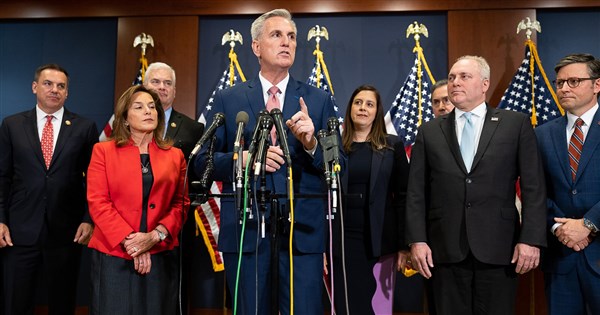2022/12/12 08:00(updated at 08:40 on 12/12)
The new US Congress will officially take office in early January next year, and the Republican Party is expected to win the speaker presidency. The loudest voice is the Republican House Leader McCarthy (front 2 from the left). (Image via facebook.com/RepKevinMcCarthy)
When the midterm elections were held in the United States on November 8, voters marched to the polls amid economic stagnation and inflation. The Republican Party has threatened to wrest control of both houses of Congress from the Democrats, and if this is the case, then Democratic President Joe Biden will be restricted by Congress, and he may be paralyzed in the last two years of his term. Another significance of Republican control of both houses of Congress is that former President Trump may be inspired to return and compete for the White House in 2024.
(CNA reporter Jiang Jinba, Washington, XI) The new US Congress will officially take office in early January next year, and the Republican Party is expected to win the speaker position. However, dissenting voices have recently appeared in the party. In addition to Biggs, who announced his challenge, some MPs also reported that they intend to support other candidates.
The 118th Congress of the United States will officially begin its session on January 3 next year, and 435 members of the House of Representatives will elect a new President of Congress on that day. The Republican Party, which has just won a majority of seats in the House of Representatives, is expected to win the House Speaker, with Kevin McCarthy of California being the most likely candidate for Speaker. In an interview with CNN a few days ago, he also stated that he was confident that he would win the required 218 votes for the Speaker’s seat.
However, McCarthy has recently faced challenges from his fellow party members. Arizona Congressman Andy Biggs, who is affiliated with the far-right Freedom Caucus, has officially announced that he will run for the Speaker’s seat.
In mid-November, McCarthy defeated Biggs’ strong challenge and was re-elected as the Republican leader of the House of Representatives, showing that McCarthy still had more partisan support than Biggs. However, with the Republicans holding only a small lead in the House of Representatives, the Republicans cannot afford to be divided.
And the US political news site Politico pointed out that five members of Congress who have publicly opposed McCarthy claimed that they have a list of more than 20 people to be announced, but they have not yet reached a consensus on the speaker.
McCarthy’s main critic, Rep. Bob Good (R-NASA), denied having difficulty recruiting like-minded people. He said they are being approached more and more by MPs interested in becoming speakers.
The report indicated that deputies Roy (Chip Roy), Boipper (Lauren Boibert) and B. Lee (Scott Berry) were the main participants in these meetings. Representative Norman (Ralph Norman) has also publicly stated that he is looking for a candidate for Speaker, and said he already has a case, but refuses to disclose it.
CNN reported a few days ago that the possibility of multiple rounds of voting for the next Speaker of the House is increasing, and it will be the first time since 1923. McCarthy’s allies and political opponents are already beginning to figure out what to do if he fails to get 218 votes in the round. First, the situation is unpredictable.
Despite facing challenges from within the party, McCarthy is still actively implementing his political views, as he recently announced that he will form a special committee on China issues, chaired by Representative Mike Gallagher, and the committee will focus on economic and security competition with China.
McCarthy’s office said the committee would investigate China’s role as a supplier of the powerful opioid pain reliever fentanyl, the Chinese government’s influence on American academic institutions, Beijing’s state and domestic lobbying efforts, and the installation of Chinese Communist Party propaganda. “Hidden Threats” and other issues. (Editor: Gao Zhaofen) 1111212
The text, images, audio and video on this site may not be reproduced, publicly broadcast, transmitted or used publicly without permission.

“Proud creator. Amateur music junkie. Tv scholar. Web fan. Lifelong alcohol lover. Falls down a lot. Hardcore thinker.”







